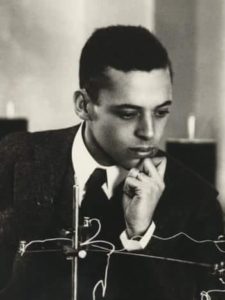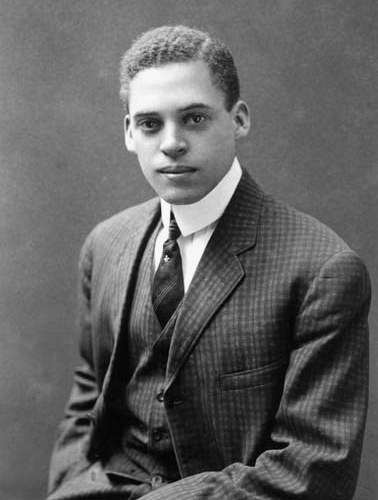Dr. Ernest E. Just was an eminent biologist and author recognized worldwide for his work unlocking the role of the cell surface in the development of organisms. He published some fifty scientific papers and two influential books, Basic Methods for Experiments on Eggs of Marine Mammals (1922) and Biology of the Cell Surface (1939).
Born on 14 August 1883, in Charleston, South Carolina, Just was only four years old when his father, Charles Fraser Just, died in 1887. Due to mounting debt, his mother, Mary Just, and her children moved from Charleston to James Island, a Gullah community off the coast of South Carolina, to work in its phosphate mines. Mary Just became a highly respected leader of the community and convinced a number of residents on the island to purchase land and start their own community. The residents renamed the community Maryville in her honor.
In 1896, Just was sent to attend the high school of the Colored Normal Industrial, Agricultural & Mechanical College (later named South Carolina State University). Believing that he would receive a superior education by attending a college preparatory school in the North, Just enrolled in Kimball Union Academy in New Hampshire in 1900. Although he was Kimball Union’s only Black student, Just recalled being in a warm and welcoming environment where he excelled in social activities and academics. After graduation from Kimball Union, Just entered Dartmouth College in 1903. In contrast to his experience at Kimball Union, Just felt alone and socially isolated at Dartmouth. Nonetheless, he graduated magna cum laude in biology with a minor in history in 1907. He was also elected to Phi Beta Kappa.
 After receiving his degree, Just accepted a position at Howard University as an instructor of rhetoric and English. In 1910, he joined the Department of Biology and was appointed professor in 1912. In 1911 he helped to found Omega Psi Phi Fraternity when three Howard University students (Edgar Amos Love, Oscar James Cooper, and Frank Coleman), approached him about establishing the first Black fraternity on campus. Howard’s White faculty and administration initially opposed the idea, but he worked to mediate the controversy and on December 15, 1911, Omega Psi Phi, Alpha Chapter, was chartered on Howard’s campus. Just later joined Sigma Pi Phi Fraternity.
After receiving his degree, Just accepted a position at Howard University as an instructor of rhetoric and English. In 1910, he joined the Department of Biology and was appointed professor in 1912. In 1911 he helped to found Omega Psi Phi Fraternity when three Howard University students (Edgar Amos Love, Oscar James Cooper, and Frank Coleman), approached him about establishing the first Black fraternity on campus. Howard’s White faculty and administration initially opposed the idea, but he worked to mediate the controversy and on December 15, 1911, Omega Psi Phi, Alpha Chapter, was chartered on Howard’s campus. Just later joined Sigma Pi Phi Fraternity.
Ernest Just worked for many years at the Marine Biological Laboratory in Woods Hole, Massachusetts. At the laboratory he realized that a doctorate in the sciences was necessary in order to move forward in the field. HE appl and he began a program of self-study at the University of Chicago. He earned a doctorate in zoology in 1916.
Despite his Ph.D., he could not find work at any White universities in America and so Just moved to Europe and continued his research in Naples, Italy. He was the first American to be invited to conduct research at the Kaiser Wilhelm Institute in Berlin, Germany in 1930; however, his research ended when the Hitler’s National Socialist Party took control over Germany in 1933. The scientist then relocated to Paris, France, to continue his research, and was working at the Station Biologique in Roscoff, France when the Germans invaded the country.
Ernest Just was captured and held briefly in a prisoner-of-war camp until rescued by the U.S. State Department and brought back to the U.S. in 1940. He had been ill for months before his detention as a POW, but his condition deteriorated during his capture and long after his return to the United States.
Dr. Ernest Just was married to Ethel Highwarden from 1912 to 1939, with whom he had three children. His second wife was Maid Hedwig Schnetzler, a German national. Ernest Everett Just died in Washington, D.C. on October 27, 1941. He was 58 years old.

